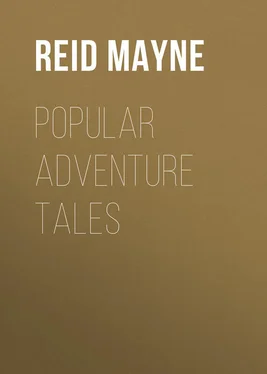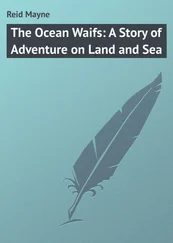Mayne Reid - Popular Adventure Tales
Здесь есть возможность читать онлайн «Mayne Reid - Popular Adventure Tales» — ознакомительный отрывок электронной книги совершенно бесплатно, а после прочтения отрывка купить полную версию. В некоторых случаях можно слушать аудио, скачать через торрент в формате fb2 и присутствует краткое содержание. Жанр: literature_19, foreign_antique, foreign_prose, foreign_children, на английском языке. Описание произведения, (предисловие) а так же отзывы посетителей доступны на портале библиотеки ЛибКат.
- Название:Popular Adventure Tales
- Автор:
- Жанр:
- Год:неизвестен
- ISBN:нет данных
- Рейтинг книги:3 / 5. Голосов: 1
-
Избранное:Добавить в избранное
- Отзывы:
-
Ваша оценка:
- 60
- 1
- 2
- 3
- 4
- 5
Popular Adventure Tales: краткое содержание, описание и аннотация
Предлагаем к чтению аннотацию, описание, краткое содержание или предисловие (зависит от того, что написал сам автор книги «Popular Adventure Tales»). Если вы не нашли необходимую информацию о книге — напишите в комментариях, мы постараемся отыскать её.
Popular Adventure Tales — читать онлайн ознакомительный отрывок
Ниже представлен текст книги, разбитый по страницам. Система сохранения места последней прочитанной страницы, позволяет с удобством читать онлайн бесплатно книгу «Popular Adventure Tales», без необходимости каждый раз заново искать на чём Вы остановились. Поставьте закладку, и сможете в любой момент перейти на страницу, на которой закончили чтение.
Интервал:
Закладка:
In the canoe there were other objects of interest. There were blankets and buffalo robes; there was a small canvas tent folded up; there were bags of provisions, and some cooking utensils; there was a spade and an axe; there were rifles – three of them – and a double-barrelled shot-gun; besides a fish-net, and many other articles, the necessary equipments for such a journey.
Loaded almost to the gunwale was that little canoe, yet lightly did it float down the waters of the Red River of the North.
CHAPTER III
THE TRUMPETER SWAN AND THE BALD EAGLE
It was the spring season, though late. The snow had entirely disappeared from the hills, and the ice from the water, and the melting of both had swollen the river, and rendered its current more rapid than usual. Our young voyageurs needed not therefore to ply their oars, except now and then to guide the canoe; for these little vessels have no rudder, but are steered by the paddles. The skilful voyageurs can shoot them to any point they please, simply by their dexterous handling of the oars; and Basil, Lucien, and François, had had sufficient practice both with “skiffs” and “dug-outs” to make good oarsmen of all three. They had made many a canoe trip upon the lower Mississippi and the bayous of Louisiana; besides their journey up the St. Peter's had rendered them familiar with the management of their birchen craft. An occasional stroke of the paddle kept them in their course, and they floated on without effort.
Norman – such was the name of their Canadian or Highland cousin – sat in the bow and directed their course. This is the post of honour in a canoe; and as he had more experience than any of them in this sort of navigation, he was allowed habitually to occupy this post. Lucien sat in the stern. He held in his hands a book and pencil; and as the canoe glided onward, he was noting down his memoranda. The trees upon the banks were in leaf – many of them in blossom – and as the little craft verged near the shore, his keen eye followed the configuration of the leaves, to discover any new species that might appear.
There is a rich vegetation upon the banks of the Red River; but the flora is far different from that which appears upon the low alluvion of Louisiana. It is Northern, but not Arctic. Oaks, elms, and poplars, are seen mingling with birches, willows, and aspens. Several species of indigenous fruit trees were observed by Lucien, among which were crab-apple, raspberry, strawberry, and currant. There was also seen the fruit called by the voyageurs “le poire,” but which in English phraseology is known as the “service-berry.” It grows upon a small bush or shrub of six or eight feet high, with smooth pinnate leaves. These pretty red berries are much esteemed and eaten both by Indians and whites, who preserve them by drying, and cook them in various ways.
There was still another bush that fixed the attention of our young botanist, as it appeared all along the banks, and was a characteristic of the vegetation of the country. It was not over eight feet in height, with spreading branches of a grey-colour. Its leaves were three inches wide, and somewhat lobed like those of the oak. Of course, at this early season, the fruit was not ripe upon it; but Lucien knew the fruit well. When ripe it resembles very much a red cherry, or, still more, a cranberry, having both the appearance and acrid taste of the latter. Indeed, it is sometimes used as a substitute for cranberries in the making of pies and tarts; and in many parts it is called the “bush cranberry.”
The name, however, by which it is known among the Indians of Red River is “ anepeminan ” from “ nepen ,” summer, and “ minan ,” berry. This has been corrupted by the fur-traders and voyageurs into “Pembina;” hence, the name of a river which runs into the Red, and also the name of the celebrated but unsuccessful settlement of “Pembina,” formed by Lord Selkirk many years ago. Both took their names from this berry that grows in abundance in the neighbourhood. The botanical appellation of this curious shrub is Viburnum oxycoccos ; but there is another species of the viburnum, which is also styled “oxycoccos.” The common “snowball bush” of our garden is a plant of the same genus, and very like the “Pembina,” both in leaf and flower. In fact, in a wild state they might be regarded as the same; but it is well known that the flowers of the snowball are sterile, and do not produce the beautiful bright crimson berries of the “Pembina.”
Lucien lectured upon these points to his companions as they floated along. Norman listened with astonishment to his philosophic cousin, who, although he had never been in this region before, knew more of its plants and trees than he did himself. Basil also was interested in the explanations given by his brother. On the contrary, François, who cared but little for botanical studies, or studies of any sort, was occupied differently. He sat near the middle of the canoe, double-barrel in hand, eagerly watching for a shot. Many species of water-fowl were upon the river, for it was now late in the spring, and the wild geese and ducks had all arrived, and were passing northward upon their annual migration. During the day François had got several shots, and had “bagged” three wild geese, all of different kinds, for there are many species of wild geese in America.
He had also shot some ducks. But this did not satisfy him. There was a bird upon the river that could not be approached. No matter how the canoe was manœuvred, this shy creature always took flight before François could get within range. For days he had been endeavouring to kill one. Even upon the St. Peter's many of them had been seen, sometimes in pairs, at other times in small flocks of six or seven, but always shy and wary. The very difficulty of getting a shot at them, along with the splendid character of the birds themselves, had rendered François eager to obtain one. The bird itself was no other than the great wild swan – the king of aquatic birds.
“Come, brother!” said François, addressing Lucien, “bother your viburnums and your oxycocks! Tell us something about these swans. See! there goes another of them! What a splendid fellow he is! I'd give something to have him within range of buckshot.”
As François spoke he pointed down-stream to a great white bird that was seen moving out from the bank. It was a swan, and one of the very largest kind – “a trumpeter.”
It had been feeding in a sedge of the wild rice, and no doubt the sight of the canoe or the plash of the guiding oar had disturbed, and given it the alarm. It shot out from the reeds with head erect and wings slightly raised, offering to the eyes of the voyageurs a spectacle of graceful and majestic bearing, that, among the feathered race at least, is quite inimitable.
A few strokes of its broad feet propelled it into the open water near the middle of the stream, when, making a half wheel, it turned head down the river, and swam with the current.
At the point where it turned it was not two hundred yards ahead of the canoe. Its apparent boldness in permitting them to come so near without taking wing, led François to hope that they might get still nearer; and, begging his companions to ply the paddles, he seized hold of his double-barrel, and leaned forward in the canoe. Basil also conceived a hope that a shot was to be had, for he took up his rifle, and looked to the cock and cap. The others went steadily and quietly to work at the oars. In a few moments the canoe cleft the current at the rate of a galloping horse, and one would have supposed that the swan must either at once take wing or be overtaken.
Not so, however. The “trumpeter” knew his game better than that. He had full confidence both in his strength and speed upon the water. He was not going to undergo the trouble of a fly, until the necessity arose for so doing; and, as it was, he seemed to be satisfied that that necessity had not yet arrived. The swim cost him much less muscular exertion than flying would have done, and he judged that the current, here very swift, would carry him out of reach of his pursuers.
Читать дальшеИнтервал:
Закладка:
Похожие книги на «Popular Adventure Tales»
Представляем Вашему вниманию похожие книги на «Popular Adventure Tales» списком для выбора. Мы отобрали схожую по названию и смыслу литературу в надежде предоставить читателям больше вариантов отыскать новые, интересные, ещё непрочитанные произведения.
Обсуждение, отзывы о книге «Popular Adventure Tales» и просто собственные мнения читателей. Оставьте ваши комментарии, напишите, что Вы думаете о произведении, его смысле или главных героях. Укажите что конкретно понравилось, а что нет, и почему Вы так считаете.












